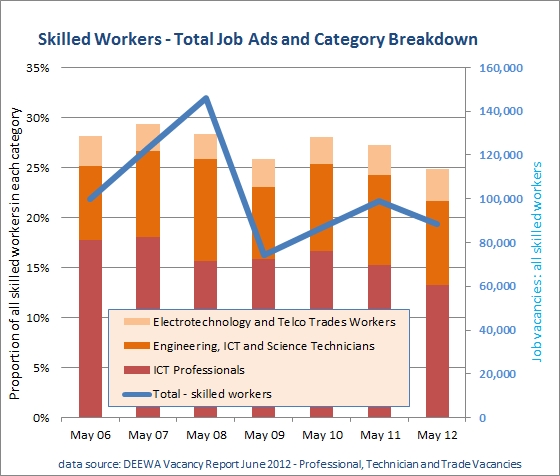Jobwatch: demand down for skilled IT

Technology workers have been shielded from the impact of the economy because of the shortage of skilled workers — but could that be on the verge of changing?
Figures published by the Department of Education, Employment and Workplace Relations show that there is a noticeable slide in the numbers of jobs advertised online for skilled workers of any description (not just in the ICT sector). We saw job opportunities peak in early 2008, and then drop significantly as we felt the impact of the global financial crisis: in October 2009, there were half as many job advertisements for skilled workers as there were in January 2008.
That all changed last year, as the recovery saw job advertising rise. However, it reached just 70 per cent of the 2008 peak; in April last year, the market started to slide again. Job advertisements are now 12 per cent down on where they were a year ago.
It's been worse news for those engaged in technology. While demand for skilled workers has fallen across the board, ICT job advertisements have fallen further; 15 per cent of all skilled jobs advertised a year ago were for ICT professionals, while last month, that figure fell to 13 per cent. (Just two years ago, it was as high as 17 per cent.) Only electronic and telecommunications trades workers can be encouraged by the figures; they are in one of the few categories to see job advertisements rise over the first five months of this year.

(Credit: Phil Dobbie/ZDNet Australia)
There are two possible reasons from the drop in job advertisements. One is that many ICT jobs are viewed as being discretionary, and uncertainty in the global economy means that projects are being shelved. In the public sector, we're seeing cutbacks as the government fights to balance the budget by next year. That helps to explain why jobs for ICT professionals in Canberra have dropped 19 per cent over the last 12 months.
The other possible reason could simply be that there's a much slower turnover in staff. Uncertainty might be encouraging people to stay with their current jobs, rather than risk a move.
There is also a seeming paradox here: even though job opportunities are falling, there remains a shortage of suitably skilled applications in the ICT space. The Clarius Skills Index for the March Quarter showed that demand for ICT professionals outstripped supply by about 5 per cent. Clarius classifies such a shortage as "extreme", and ICT is one of the few categories where this occurred.
But warning bells are starting to ring there, as well. Clarius noted that the gap is narrowing as demand falls.
So, if you're an ICT professional casualty of the downturn, the advice to "go west" (as mentioned in our last Job Watch article) remains good. Jobs for ICT professionals (as distinct from ICT technicians) have risen 16 per cent in Sydney, and 14 per cent in Melbourne since the start of the year, but they're 20 per cent up in Perth and 22 per cent up in Darwin.